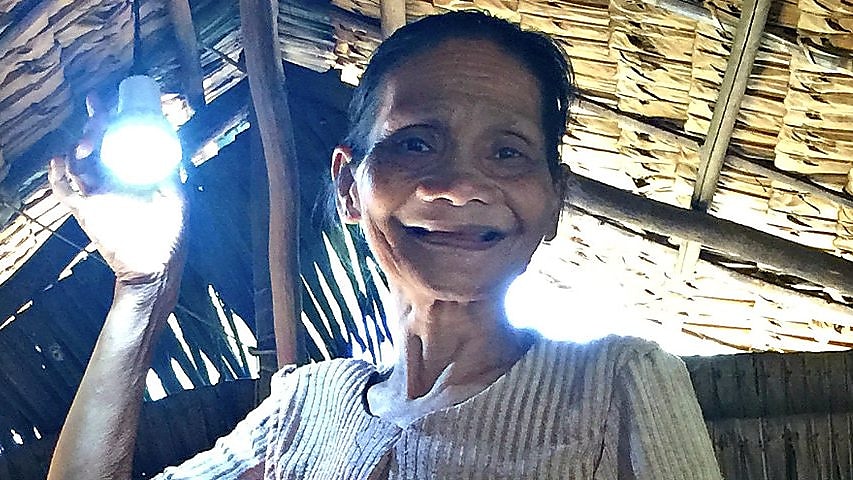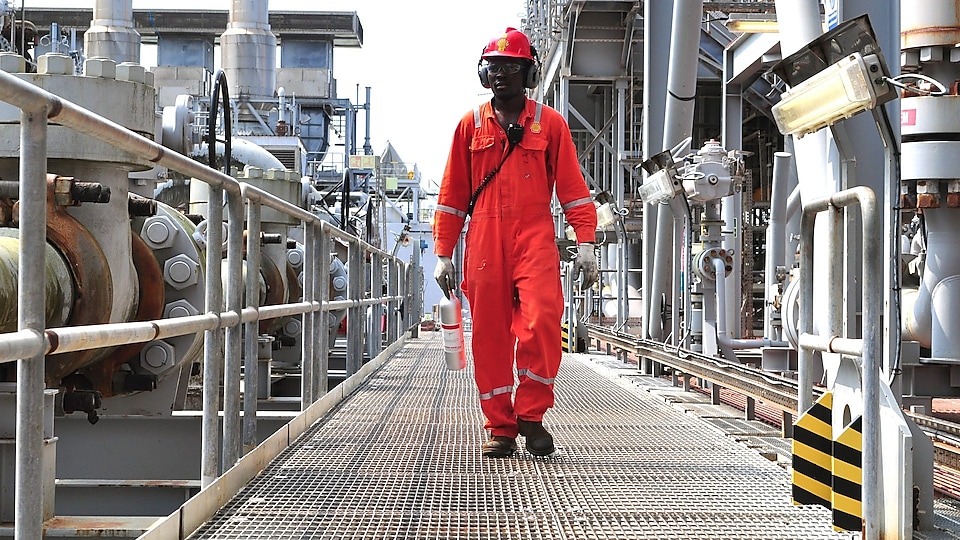
Community health
We run various projects in some of the communities where we operate, often in partnership with local NGOs or development bodies, to improve access to healthcare for local people and to reduce the spread of diseases like HIV/AIDS and malaria.
Covid19: Shell’s global response: At the current time, as the global impact of the COVID-19 virus spreads, the health and safety of everyone affected by this pandemic is our highest priority. Shell is putting the safety and health of our people and our customers first, along with the safe operations of all our businesses. Please also see Covid19: Shell’s global response updated regularly for details.
Today, millions of people across the world are unable to access medical treatment. In some communities where we work, access to healthcare may be limited or inadequate. For example, parts of Iraq have an acute shortage of doctors and other medical staff due to ongoing local conflicts and war.
To help address these challenges, Shell runs various projects that provide access to adequate healthcare to communities, often in partnership with local non-governmental organisations or development bodies. We also have health facilities that are available to employees, contractors and, where possible, to local people.
In the Niger Delta, for example, the Obio Cottage Hospital in Port Harcourt has become one of the most visited health facilities in the region. It was set up by Shell Petroleum Development Corporation (SPDC) in 2010 and offers a community health insurance scheme.
In Iraq, we partner with the AMAR International Charitable Foundation (Amar Icf), a charity that helps communities in the Middle East to rebuild their lives after conflict. Together, we train women from local communities to provide vital health services to thousands of people every month, supporting health education in schools as well as providing access to clean water.
Improving access to clean water
India’s growing population means many of its natural resources are being stretched. This includes water. There are supplies across parts of the country that are contaminated by sewage or agricultural run-off. This can lead to chronic diarrhea and gastroenteritis.
Now a community-run project in one village in Western India is helping to make a difference. It is supported by Shell’s Hazira joint venture, which operates a liquefied natural gas (LNG) terminal and plant nearby.
Working with the community, Hazira LNG’s social performance team helped to install a reverse osmosis drinking water plant. Villagers pay in advance to fill their water bottles each day. Doctors report that visits from patients with water-related illnesses are now less frequent. More people are enjoying access to affordable, clean drinking water.
Watch this film to find out more.
Watch: Improving access to clean water
Title: Improving Access to Clean Water - Hazira LNG
Duration: 3:26 minutes
Description:
Meeting the challenge of the contamination of India’s water to supply clean drinking water through an innovative community project supported by Hazira LNG – a reverse osmosis drinking water plant.
Improving Access to Clean Water - Hazira LNG Transcript
[Background music plays]
Instrumental music with an Indian flavour, at times with light and delicate notes, at times more rhythmic and dramatic.
[Narrator]
With India’s population over the 1.3 billion mark, many of the country’s natural resources are being stretched, including water, with many sources contaminated from sewage and agricultural run-off.
[Video footage]
Footage of bustling streets in India, The Red Fort in the background and pedestrians, cabs, buses and other vehicles filling the streets.
Low angle view of the Indian flag flying from The Red Fort.
Bird’s eye view of bustling city streets, multi-storey buildings lining the streets.
High angle vertically panning footage of a river. Tall buildings along the banks and blue sky above form the background.
Footage of the soil along the banks of the river. The soil has a greenish tinge.
Aerial footage showing the greenish tinge along the banks of the river.
Interview with Dr. Manohar Ghemawat
[Title]
Village Doctor / Gujarat, India
[Text displays]
Dr. Manohar Ghemawat / Village Doctor / Gujarat, India
[Dr. Ghemawat]
Because of the poor sanitation, gastroenteritis was very common when the people are using contaminated water or well water.
[Video footage]
Mid-shot of Dr Ghemawat speaking to the interviewer who is out of shot, against the background of his surgery.
Footage of a villagers collecting water in canisters or drinking water from a communal water spout under a tree.
Interview with Ila Ben Patel
[Title]
Resident / Hazira, India
[Text displays]
Ila Ben Patel / Resident / Hazira, India
[Ila – subtitles]
When we drank the other water we frequently fell sick, so every month or two we had to go the hospital.
[Video footage]
Low angle footage of a woman entering the doctor’s surgery.
Footage of the woman and the doctor conversing across his desk.
Mid-shot of Ila speaking to the interviewer who is out of shot, against the background of green foliage.
[Narrator]
But in one village in Western India, an innovative community project supported by Hazira LNG is making a difference. They supported the village panchayat, a local community group, to build a reverse osmosis drinking water plant.
[Video footage]
Low angle view of the Indian flag flying against the sky.
Bird’s eye view of Hazira LNG plant and entrance.
Footage of the LNG tanks.
Footage of a villager dispensing drinking water into a 20 litre bottle. More 20 litre bottles are lined up and other villagers stand in the background.
Footage of two small filters in the process of filtering water.
Interview with Shailendra Khalashi
[Title]
Project Manager / KVSVS
[Text displays]
Shailendra Khalashi / Project Manager / KVSVS
[Shailendra – subtitles]
The water comes from the well, which then goes into our tank. From tank it goes directly into the sand filter, which processes the water. From the sand filter, the water then goes into carbon filter next to it. After the carbon filter processes the water, it is channelled to two small filters. Finally, one part of the water is clean, which is stored in our tank. The waste water goes outside.
[Video footage]
Wide view of Shailendra speaking to the interviewer who is out of shot, standing alongside the reverse osmosis system. He points in turn to the tank, sand filter, carbon filter, and the previously described small filters, as he mentioned each one’s role in the reverse osmosis process.
[Narrator]
To avoid problems of power shortage, the water plant runs on solar power. It has a storage capacity of 4,000 litres.
[Video footage]
Close-up of a switch being flipped to start the process.
Close-up of one of the small filters in the process of filtering water.
Footage of a bank of solar panels, cutting to footage of the sun against an orange sky.
Panning footage of the sand and carbon filter abreast of one another.
[Narrator]
Each family is given a standard 20 litre bottle which is used for collecting water from the reverse osmosis plant. How the programme works is also unusual. Studying similar projects in India, the team saw that programmes or facilities provided for free to communities didn’t always last.
[Video footage]
Reverse angle footage of a man carrying a 20 litre bottle in each hand, walking towards the water collection point.
Footage of a boy placing his bottles alongside the other waiting bottles and waiting with other villagers while they are filled.
Footage of a number of filled 20 litre bottles being placed in a vehicle.
Footage of a woman carrying a 20 litre bottle entering the property to join the others waiting to have their bottles filled.
Footage of a man filling a bottle with water from the tap, cutting to a close-up of his face and then of another villager’s face.
[Narrator]
So from the onset, the solution in Hazira had to be sustainable and involve the community. They drew up a pay and use system, designed as a social enterprise where villagers pay six rupees to fill water bottles.
[Video footage]
Wide footage of the villagers gathered around the tap and bottles at the water collection point.
More footage of the man filling the bottles, and a woman leaving with the water bottle on her head, accompanied by a man and small boy.
Footage of a woman holding her pay-and-use card as she waits with her bottle.
More footage of the villagers waiting at the water collection point. A man is seated at a desk with a book and a stack of the pay and use cards. Villagers, including Ila, approach him and he fills out their cards.
[Ila – subtitles]
We have a card which allows us to collect water, and our water collections are recorded in it. We have to recharge the card in advance by paying the fees to the operator.
[Video footage]
Mid-shot of Ila speaking to the interviewer who is out of shot, against the background of green foliage.
High angle view of the man at the desk filling out a pay and use card.
Mid-shot of Ila speaking to the interviewer who is out of shot, against the background of green foliage.
Reverse angle footage of Ila walking down the street with her bottle of water on her head.
[Shailendra – subtitles]
We don’t supply free water, but we collect a nominal fee from the customers to run the solar plant.
[Video footage]
Wide view of Shailendra speaking to the interviewer who is out of shot, standing alongside the reverse osmosis system.
Close-up footage of the various controls and meters of the reverse osmosis system.
[Narrator]
Hazira LNG helped with the infrastructure but the ongoing system is run by the community. Today, nearly 300 households are enrolled in the programme.
[Video footage]
Footage of the water collection point as various villagers leave with their bottles of water, and others collect around the desk having their cards filled out.
[Ila – subtitles]
With this clean water, our health has improved and we save on hospital and medicine fees. Our whole village has enjoyed the benefits that clean water brings.
[Video footage]
Reverse angle footage of a woman walking down the street carrying her bottle of water on her head, and accompanied by a small boy.
Mid-shot of Ila speaking to the interviewer who is out of shot, against the background of green foliage.
Interview with Ramila Ben
[Title]
Resident / Hazira, India
[Text displays]
Ramila Ben / Resident / Hazira, India
[Ramila]
We don’t have to drink boiled water, now that we get clean water. Everything is good.
[Video footage]
Footage of a young man placing his bottle of water on his bicycle.
Close-up of Ramila speaking to the interviewer who is out of shot, against the background of the water collection point.
[Narrator]
Currently, most families in the village use this water. There are plans to expand this successful programme to other rural villages in India. And the hope is that the initiative in Hazira will be able to sustain a clean water supply for many years to come.
[Video footage]
Footage of a man cycling towards the shot, carrying numerous containers on the back of his three-wheel bicycle.
Reverse angle footage of a group of teenage boys walking up a street. There are houses lining the street.
Footage of a small boy at the entrance of a house in the village. A young girl runs past him and into the house.
Front view of Ila approaching, carrying her bottle of water on her head.
Reverse angle footage of Ila’s swishing skirt and feet as she walks down the street.
[Text displays]
www.shell.com/communities
[Audio]
Shell jingle
[Text displays]
© Shell International Limited 2016
Reducing the spread of disease
We contribute to various global partnerships to offer our expertise to fight the spread of diseases such as HIV/AIDS. We are a member of the Global Business Coalition on Health (GBCHealth) and also develop local partnerships in the regions and countries where we operate.
We are currently implementing our HIV/AIDS programme in more than 60 countries around the world. We support initiatives to tackle HIV/AIDS at local, national and international level. We focus especially on highly affected areas such as sub-Saharan Africa and selected major construction projects.
Drawing on experience gained through our operations in sub-Saharan African countries, where HIV/AIDS is a major health concern, we have worked with UNAIDS to develop scenarios for ways in which the disease could spread in future. This work will help the UN and other bodies to identify the actions required to respond appropriately to different circumstances.
In Nigeria we are part of Niger Delta AIDS Response (NiDAR), while in South Africa, we have launched an initiative that brings mobile clinics into Shell service station forecourts. We are also working with a number of partners to help us implement our HIV/AIDS guidelines in lower prevalence areas, such as the Middle East.
Tackling malaria
In the Philippines, we participate in a long-term private-public partnership in malaria control called Movement Against Malaria (MAM). MAM is one of the flagship public-private health programmes in the country, aimed at eradicating malaria in the Philippines by 2020. By 2011, there was an 87% reduction in the total number of malaria cases and a 96% reduction in deaths compared with a 2003 baseline.
To date, long-lasting insecticide-treated mosquito nets have been distributed in 40 provinces. More than 10,000 health service providers have been trained and nearly two million diagnostic consultations have taken place.
More In Sustainability
Access to energy
For many in the world, better access to energy could mean the difference between poverty and prosperity: it affects their health, education and their ability to earn a living.
Local employment and enterprise
Shell contributes to local economic growth in countries where we operate.
You may also be interested in
Online Shell Sustainability Report
View our latest report online and build your own PDF version with the topics that matter most to you.
Our values
At Shell, we share a set of core values – honesty, integrity and respect for people – which underpin all the work we do. The Shell General Business Principles, Code of Conduct, and Ethics and Compliance Manual help everyone at Shell act in line with these values and comply with relevant laws and regulations.



